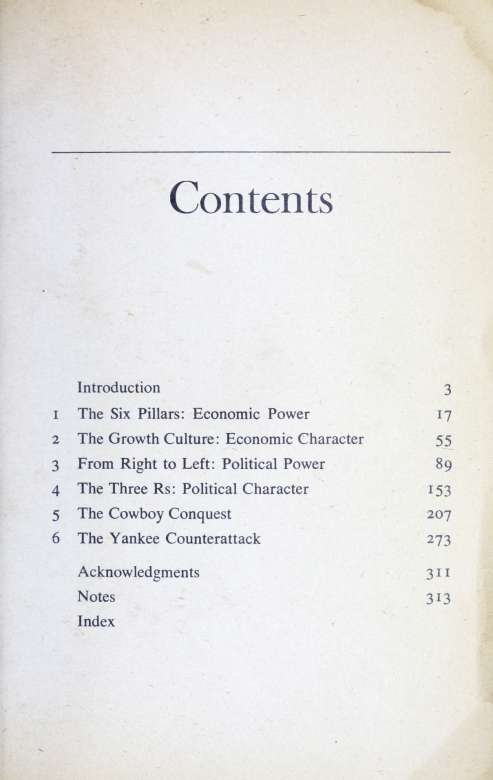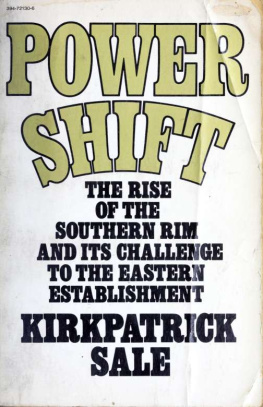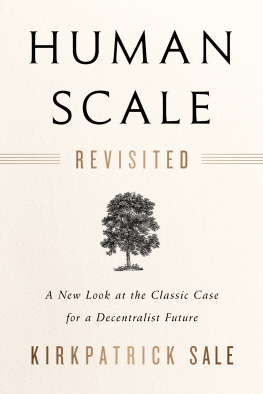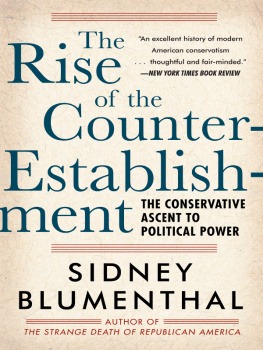Kirkpatrick Sale - Power Shift: The Rise of the Southern Rim and Its Challenge to the Eastern Establishment
Here you can read online Kirkpatrick Sale - Power Shift: The Rise of the Southern Rim and Its Challenge to the Eastern Establishment full text of the book (entire story) in english for free. Download pdf and epub, get meaning, cover and reviews about this ebook. year: 1976, publisher: Random House Inc, genre: History / Science. Description of the work, (preface) as well as reviews are available. Best literature library LitArk.com created for fans of good reading and offers a wide selection of genres:
Romance novel
Science fiction
Adventure
Detective
Science
History
Home and family
Prose
Art
Politics
Computer
Non-fiction
Religion
Business
Children
Humor
Choose a favorite category and find really read worthwhile books. Enjoy immersion in the world of imagination, feel the emotions of the characters or learn something new for yourself, make an fascinating discovery.
- Book:Power Shift: The Rise of the Southern Rim and Its Challenge to the Eastern Establishment
- Author:
- Publisher:Random House Inc
- Genre:
- Year:1976
- Rating:5 / 5
- Favourites:Add to favourites
- Your mark:
- 100
- 1
- 2
- 3
- 4
- 5
Power Shift: The Rise of the Southern Rim and Its Challenge to the Eastern Establishment: summary, description and annotation
We offer to read an annotation, description, summary or preface (depends on what the author of the book "Power Shift: The Rise of the Southern Rim and Its Challenge to the Eastern Establishment" wrote himself). If you haven't found the necessary information about the book — write in the comments, we will try to find it.
Kirkpatrick Sale: author's other books
Who wrote Power Shift: The Rise of the Southern Rim and Its Challenge to the Eastern Establishment? Find out the surname, the name of the author of the book and a list of all author's works by series.
Power Shift: The Rise of the Southern Rim and Its Challenge to the Eastern Establishment — read online for free the complete book (whole text) full work
Below is the text of the book, divided by pages. System saving the place of the last page read, allows you to conveniently read the book "Power Shift: The Rise of the Southern Rim and Its Challenge to the Eastern Establishment" online for free, without having to search again every time where you left off. Put a bookmark, and you can go to the page where you finished reading at any time.
Font size:
Interval:
Bookmark:

This book made available by the Internet Archive.



This book is dedicated to the women of tomorrow, especially Rebekah and Kalista
~~~~ vraHBHR *
Digitized by the Internet Archive in 2014
https://archive.org/details/powershiftriseofOOsale
Documentary evidence to support every specific statement of fact in this book is cited in the Notes section beginning on page 313.

POWER SHIFT
*
Introduction
In the Oval Office of the White House, shortly before two o'clock on March 13, 1973, Richard Nixon is nearing the end of a long and rambling conversation with his counsel, John Dean, about ways to deflect the growing Watergate scandals that are just beginning to threaten his Administration. On Capitol Hill, L. Patrick Gray, Nixon's nominee to be head of the Federal Bureau of Investigation, is continuing his testimony to the Senate Judiciary Committee, before whom he has already disclosed damaging secrets that point suspicions directly to the White House; the day before, Nixon issued a proclamation denying permission for his staff members to appear before the various Senate committees, pulling a blanket of "executive privilege" hard around him to withstand the increasingly bitter winds of Watergate. The President is now feeling himself very much the beleaguered hero under attack from a cruel press and a manipulated public, and angrily declares at one point, "Nobody is a friend of ours," later on reflecting more plaintively, "It will remain a crisis among the upper intellectual types, the soft heads, our own, tooRepublicansand the Democrats and the rest." Dean, shrewd to detect and reflect the mood of his superior, soon joins in and begins berating with him "the press...
POWER SHIFT
the intellectuals," claiming they would never believe the Watergate burglars were acting alone, "they would have to paint it into something more sinister, more involved, part of a general plan." The President nods, seems to grow morose, and then bursts out with the idea that has been troubling him all along:
"On and on and on. No, I tell you this, it is the last gasp of our hardest opponents. They've just got to have something to squeal about it."
Dean, ever the second banana, begins to chime in, "It is the only thing they have to squeal" but Nixon, warming to his subject now, won't be interrupted.
"They are going to lie around and squeal. They are having a hard time now. They got the hell kicked out of them in the elections." Then just to make sure Dean appreciates the full dimensions of who this enemy is, Nixon enlarges: "There is a lot of Watergate around in this town, not so much our opponents, even the media, but the basic thing is the Establishment. The Establishment is dying, and so they've got to show that despite the successes we have had in foreign policy and in the election, they've got to show that it is just wrong, just because of this. They are trying to use this as the whole thing."
The basic thing is the Establishment.
Extraordinary. This is a President of the United States talking, and in the normal taxonomy of this country a President is regarded as a key part, if not the very center, of any "Establishment"yet here is a President who plainly sees himself outside the Establishment, and, more than that, an enemy of that Establishment. Clearly, then, Richard Nixon is changing the usual definitions, is in fact pointing to a new conception of what the Establishment is and what its position has become in mid-century America, a conception which he no doubt had never fully articulated but which his highly developed political antennae told him was nonetheless quite real. For Nixon, the Establishment is a distant and a foreign world, the world of New York and Boston and Newport and Grosse Pointe and Win-netka, the world of great wealth, high culture, nurtured traditions, industrial power, and political aristocracies, the world of "the soft heads" and "the media," the "liberal elite" and the "impudent snobs""the enemy." Nixon sees himself as standing apart from all of this, obviously a newcomer, an outsider, a
INTRODUCTION
challenger, representative of a newer breed of people who, no matter how many deals they make with this Establishment, no matter how many times they rub shoulders with it, will never be a part of that world, for they come from a new place and they hold different values and they serve variant causes. Nixon understands, if only primitively, that there is in fact a new configuration of forces in America, to which he and his Presidency are joined, that stands in opposition to the traditional Establishment and is therefore a new component to be reckoned with in the equations of national power.
Looked at in its broadest terms, the modern Establishment in America enjoyed a virtually undiminished influence from the time of its consolidation after the Civil War right down to the beginning of World War II, roughly the whole seventy-year period from 1870 to 1940. In practically every aspect of life, this country was dominated by a nexus of industrial, financial, political, academic, and cultural centers based in the Northeast, stretching from Chicago to New York, from Boston to Philadelphia, and associated with the names of Mellon, Carnegie, Rockefeller, Morgan, Ford, McCormick, Vanderbilt, and the like. It was this nexus that influenced the selection of Presidential candidates (between 1869 and 1945 only two Presidents were born outside of the Northeast), that controlled the houses of Congress, that determined American foreign policy, that set the economic priorities and directions, that more or less created the cultural and moral standards, that determined who were to be the powerful and the powerless. And such provincial areas as did manage to grow up at the same timethe San Francisco Bay Area, say, with its "upstart" A. P. Giannini, founder of the Bank of America, or New Orleans, prosperous through the Mississippi River trafficwere largely contained in their remoter regions and allowed to exert very little economic or political influence on a national scale.
All that began to change with the advent of World War II and its new technologies and priorities. Slowly there grew up a rival nexus, based in the Southern and Western parts of the country that stand in geographicaland to a large degree cultural, economic, and political-opposition to the Northeast, specifically in the Southern Rim, the broad band of America
POWER SHIFT
that stretches from Southern California through the Southwest and Texas, into the Deep South and down to Florida. Here a truly competitive power base took shape, built upon the unsurpassed population migrations that began to draw millions and millions of people from the older and colder sections of the Northeast to the younger and sunnier sections of the South and Southwest... upon an authentic economic revolution that created the giant new postwar industries of defense, aerospace, technology, electronics, agribusiness, and oil-and-gas extraction, all of which were based primarily in the Southern Rim and which grew to rival and in some cases surpass the older industries of the Northeast... upon the enormous growth of the federal government and its unprecedented accumulation of wealth, the great part of which went to develop and sustain the new areas and the new government-dependent industries, the new ports and new inland transportation systems, the new military and aerospace bases and the new water and irrigation systems... upon the political development of the Southern Rim and its growing influence in almost all national party organizations of whatever stripe, its decisive role in the selection of candidates of both major parties, its control over the major committees and much of the inner workings of Congress, and ultimately, from 1963 to 1974, its occupancy of the Presidency itself. Over the last thirty years, this rival nexus, moving on to the national stage and mounting a head-on challenge to the traditional Establishment, has quite simply shifted the balance of power in America away from the Northeast and toward the Southern Rim.
Font size:
Interval:
Bookmark:
Similar books «Power Shift: The Rise of the Southern Rim and Its Challenge to the Eastern Establishment»
Look at similar books to Power Shift: The Rise of the Southern Rim and Its Challenge to the Eastern Establishment. We have selected literature similar in name and meaning in the hope of providing readers with more options to find new, interesting, not yet read works.
Discussion, reviews of the book Power Shift: The Rise of the Southern Rim and Its Challenge to the Eastern Establishment and just readers' own opinions. Leave your comments, write what you think about the work, its meaning or the main characters. Specify what exactly you liked and what you didn't like, and why you think so.












